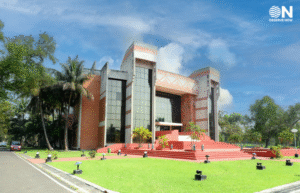ObserveNow Media to Host the 3rd Edition of PSU Summit & Awards in New Delhi
ObserveNow Media is gearing up to host the 3rd Edition of the PSU Summit & Awards on September 19, 2024, in New Delhi. Themed “Transforming the Public Sector: A Vision for the Future,” this one-day event will bring together leaders, stakeholders, and experts from across India’s Public Sector Undertakings (PSUs) for a comprehensive exploration of the challenges and opportunities shaping the future of government-owned enterprises.
The summit aims to foster dialogue around innovation and public enterprise management, positioning itself as a critical platform for PSUs navigating the path to future transformation.
The event promises a robust agenda, featuring 40+ speakers, 10+ industry leaders, and 120+ delegates. It is designed to drive conversations on the evolving public sector landscape, supported by partners like Cloudera as the Platinum Partner, 3rd Eye Techno Solutions as the Digital Forensic Partner, Alliance Pro & Skillmine as Associate Partners, and Array, Will & Decathlon as Exhibitors. The event’s CSR initiative is supported by Pleasin Strides.
The summit will open with a welcome note from Taniya Tikoo, Co-Founder & Editor-in-Chief of ObserveNow, setting the stage for a day of high-level discussions. The keynote address will be delivered by Lt. General Vinod G. Khandare, Principal Adviser, Ministry of Defence, Government of India, followed by Novman Ahmed, Managing Director of HSCC. Special addresses will be delivered by Arvind Kumar, Director General of Software Technology Parks of India (STPI), and S.C. Garg, Executive Director (Tech.), REC, who will bring their insights into the evolving roles of PSUs in the public sector ecosystem.
The first panel discussion, “Future of PSUs: Catalysts for India’s Development by 2047,” will feature thought leaders from various PSUs. Moderated by Jaspreet Singh, Clients & Markets Leader – Advisory Services at Grant Thornton Bharat LLP, this session will bring together Prashant Kumar Mittal, Deputy Director General (DDG), NIC, Government of India; Manish Grover, Executive Director (Strategic IS & IS), Indian Oil Corporation Limited; Dr. Prashant Atrey, Executive Director (IT) and HOD, NHPC Limited; Doman Yadav, Executive Director, Power Grid Corporation of India; S.C. Garg, Executive Director (Tech.), REC; S.K. Jain, Executive Director, Indraprastha Gas Limited (IGL); and Dr. B Chandrasekar, Executive Director, EdCIL India Limited. Together, they will discuss the transformative role PSUs can play in driving India’s development by 2047.
The second panel, “Accelerating AI Adoption in the Public Sector: Leveraging Trusted Data & Unified Hybrid Data Platforms,” will delve into the role of artificial intelligence in shaping the future of the public sector. Moderated by Sunny Kapoor, Director – Technology Consulting, Ernst & Young LLP, the session will feature industry experts like Manoj Tandon, Director – Project O&M, RailTel Corporation of India; Vijay Devnath, Group General Manager (Infrastructure & Security), CRIS; Saubhagya Kumar Behera, CIO & Senior Vice President (ERP & IT), Indraprastha Gas Limited; Alok Shankar Pandey, CISO & AGM-IT, Dedicated Freight Corridor Corporation of India Ltd; Abhijit Bora, General Manager (Strategic IS), Indian Oil Corporation Limited; Jaspreet Bindra, AGM – IT, Engineers India Limited; and Piyush Agarwal, Solutions Engineering Director, India, Cloudera. This session will provide key insights into leveraging AI to enhance the capabilities of PSUs.
With numerous industry presentations showcasing products and services, the event will provide an unparalleled opportunity for companies to connect with industry leaders and explore potential collaborations.
A key highlight of the summit will be the third panel discussion, “PSUs and the Challenge of Cybersecurity in the Era of AI and Hybrid Technologies,” which will focus on the increasing importance of cybersecurity in a digital-first world. Moderated by Col (Retd) Sanjeev Relia, Senior Advisor, India Future Foundation (IFF), this session will feature Kapil Jaiswal, Director Research (InfoSec) & CISO, Government of India; Ritu Narang, Senior General Manager, Container Corporation of India; Ritu Singh, General Manager – IT, National Capital Region Transport Corporation (NCRTC); Subhash Chand, CISO, ICAR-Indian Agricultural Statistics Research Institute; Karan Kalra, Deputy CISO & Data Protection Officer, National Housing Bank; Kuldeep Singh, Alternate CISO & Deputy General Manager (IT-Security), NTPC Limited; and Nitin Chauhan, Solution Consultant, 3rd Eye Techno Solutions Pvt Ltd. The session will address the critical security challenges facing PSUs in the era of AI and hybrid technologies.
Following the session, B. Shanker Jaiswal, IPS, Joint Commissioner of Police (Tech, Cyber & Licensing), Delhi Police, will deliver a special address, alongside Golok Kumar Simli, Principal Advisor & Chief Technology Officer, Passport Seva Programme, Ministry of External Affairs. Additionally, Dr. Amit Kumar Jain, Director, Delhi Metro Rail Corporation, will deliver an exclusive address, sharing his expertise on digital transformation within public sector infrastructure.
The final panel discussion of the day, “Navigating Challenges and Opportunities: A Digital Evolution Roadmap for PSUs,” will offer a roadmap for PSUs looking to embrace digital transformation in the coming years. Moderated by Abhishek Vashisth, Director (Technology) – EY Centre of Excellence, this session will feature key industry leaders including Abhishek Agarwal, Chief Information Officer and CGM (IT), Energy Efficiency Services Ltd.; Vidya Sagar Singh, Senior General Manager, The National Small Industries Corporation Ltd.; Nagendra Pratap Singh, General Manager (Strategic Information Systems), Indian Oil Corporation Limited (IOCL); Anup Prasad, General Manager, Steel Authority of India Limited (SAIL); Salman Mahmood, Deputy General Manager, Food Corporation of India; Dipesh Jain, Deputy General Manager – IT, Power Finance Corporation; Anwaya Bilas Sengupta, Alternate CISO, Grid Controller of India Ltd; and Dr. Antarpreet Singh, Director (Academics), WILL Education.
The event will conclude with an awards ceremony recognizing PSU leaders and organisations that are driving change and elevating the nation’s economy to new heights and the summit is set to be a landmark event for India’s public sector, charting a clear course toward innovation and growth in the years to come.
For more details: https://observenowevents.in/psu/























